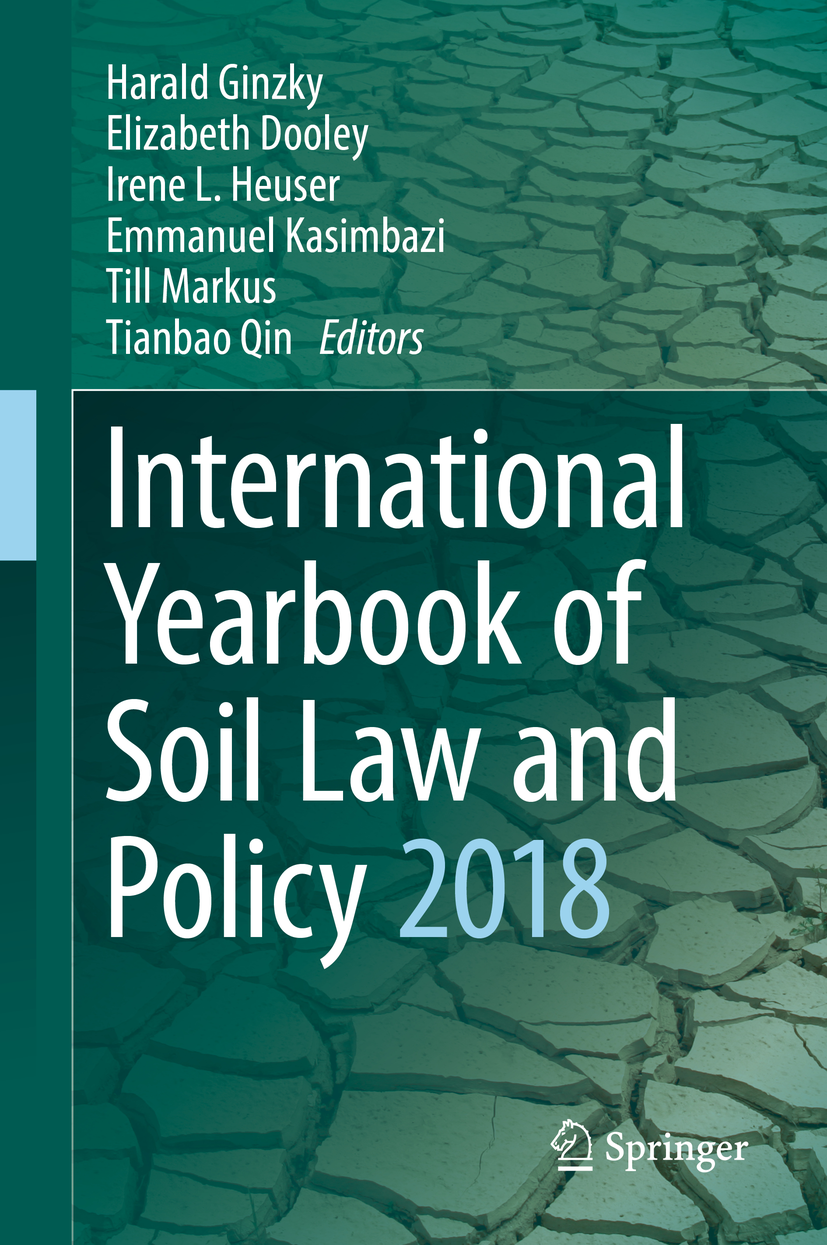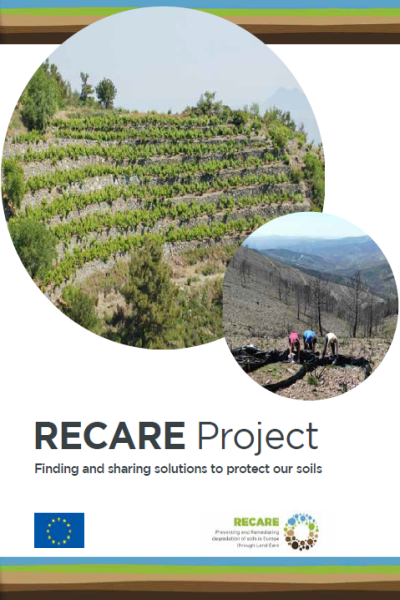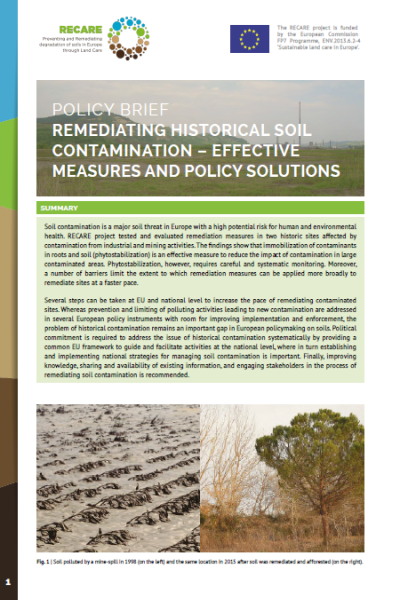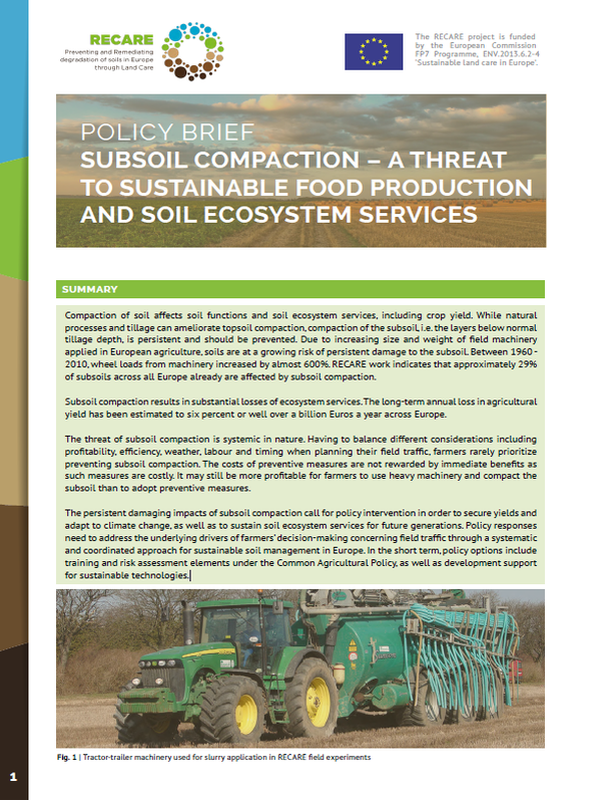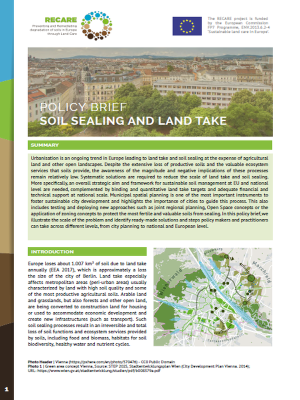Preventing and Remediating Soil Degradation (RECARE)
- Project
- Research Program
- Duration
-
-
Soils provide a range of functions upon which humans depend, such as food production, water regulation, a physical basis for construction, biodiversity and habitat for organisms, and nutrient cycling and carbon storage. In Europe, soils are threatened by numerous processes which affect their long-term ability to support such functions. RECARE aimed to identify and fill knowledge gaps as to how soil systems function under climate and human influences, and to develop sustainable land management measures to combat soil threats and restore soil functions. The project analyzed the effectiveness of such measures in the context of 17 Case Studies and conducts an integrated impact assessment of various EU and national soil-related policies in order to develop recommendations for their improvement.
Background
Soil degradation in Europe results from multiple soil threats, including soil erosion, salinization, compaction, desertification, flooding, loss of organic matter, contamination, sealing, and loss of soil biodiversity. Soil degradation can impact water and air quality, biodiversity, climate change, human health, and food security.
A well-developed body of research exists about soil systems, including their functions and ecosystem services, as well as the processes and impacts of different soil threats. However, knowledge gaps still remained as to bio-physical regulating processes and threshold behavior of soil under current and future climate conditions. Additionally, knowledge and understanding of the complex interactions between human activities and soil functionality was incomplete.
Many soil protection measures have been identified that can effectively address soil degradation, but uptake is often limited due to socio-economic, political, and cultural factors. The limited adoption and field testing of prevention, remediation and restoration measures has led to insufficient restoration of soil functions and ecosystem services. Moreover, the current regulatory framework for soil protection remained fragmented, limiting the effectiveness of policy action at the EU and Member State level.
Main objectives
The main aim of RECARE was to develop effective prevention, remediation and restoration measures through an innovative trans-disciplinary approach, actively integrating and advancing knowledge of stakeholders and scientific knowledge in 17 Case Studies, and covering a range of soil threats in different bio-physical and socio-economic environments across Europe. RECARE advanced knowledge on the following issues:
- Knowledge gaps regarding soil degradation from soil threats, soil systems, and their interaction with human activities, as well as the bio-physical, socio-economic, and political factors that contribute to soil degradation
- Prevention, remediation, and restoration land management measures to address soil threats and degradation, including their costs and benefits and quantified effects, in collaboration with stakeholders in the case study contexts
- Existing soil and land-related policies in Europe, using the study results to develop recommendations as to how policies could better address and reverse the effects of soil threats and sustain soil functionality.
Methodology
The project applied an interdisciplinary approach to analyze soil threats and develop potential prevention, remediation, and restoration measures, drawing on 17 Case Studies across Europe and considering various climatic, environmental, socio-economic, and political drivers. Active stakeholder engagement was facilitated throughout the project. Stakeholders were involved in the process of identifying threats, selecting prevention, remediation and restoration measures, and implementing and evaluating the measures in order to tailor them to local contexts. Cost-benefit analyses were performed for the various measures. Furthermore, the project utilized advanced integrated bio-physical and socio-economic modeling to upscale case study findings to the EU level. An integrated impact assessment of existing EU and national soil-related policies was performed to identify potential incoherence, contradictions and synergies. Policy recommendations were developed based on the case study results and analysis of their integration at the European level.
Ecologic Institute in RECARE
Ecologic Institute lead WP9 where an integrated impact assessment of European and national soil and land use-related policies and strategies was carried out, and policy recommendations for improving policy coherence and integration were developed. In addition, Ecologic contributed to stakeholder engagement (WP4) and the dissemination of project results (WP11), as well as provided inputs to other WPs.
RECARE Project Results and Policy Recommendations
The RECARE project has come to a successful end. Over the last 5 years, the project applied a transdisciplinary approach, actively integrating and advancing knowledge of stakeholders and scientists in 17 case studies, to identify and develop effective measures for improved soil protection in Europe. Covering a range of bio-physical and socio-economic environments across Europe, the project also identified barriers and solutions to increase the implementation of effective soil management measures. Ecologic Institute developed policy briefs on the topics "Soil Sealing and Land Take", "Subsoil compaction" and "Remediating Historical Soil Contamination", as well as co-wrote the brochure with the most important project findings. The policy briefs and the project brochure are available for download:
- The RECARE brochure describes the threats to soils in Europe, how the RECARE project has addressed these, and provides examples of effective soil management options and policy solutions.
- The Policy brief Remediating Historical Soil Contamination outlines RECARE project results on effective remediation measures and policy recommendations derived from case studies.
- The policy brief Soil sealing and land take illustrates the scale of the problem and identifies ready-made solutions and steps that policy makers and practitioners can take at different levels, from city planning to national and European level.
- The policy brief on Subsoil Compaction focuses on risks and drivers for subsoil compaction in Europe, an underappreciated soil threat affecting a third of EU soils. It shows the importance of prevention and the ways that policy can better ensure that subsoil compaction does not occur.
More than 100 participants from 21 countries discussed the most important project findings at the final policy conference which took place on 27 September in Brussels. All RECARE presentations with the most important project results are available on the RECARE homepage.






